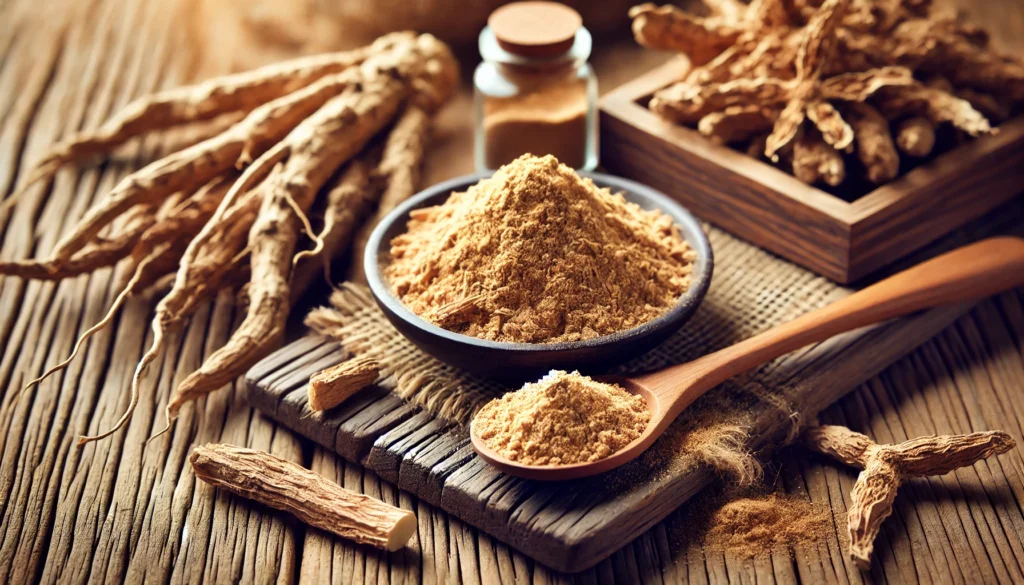Historical Context of Ashwagandha
Ashwagandha, or Withania somnifera, has been used for over 3,000 years in traditional Indian medicine. The Sanskrit word “Ashwagandha” translates to “smell of the horse,” referring not only to the herb’s distinct aroma but also to its ability to impart vigor and strength. Historically, it has been used to manage stress, enhance energy levels, and improve overall health.
Throughout history, Ashwagandha has been revered not just for its physical benefits but also for its spiritual significance. Ancient texts describe its use in rituals and as a means to enhance meditation and spiritual practices. This dual role in both physical and spiritual health highlights its integral place in Ayurvedic traditions.
In various regions across India, Ashwagandha has been applied in diverse ways, from poultices and pastes to teas and tonics. Each method of use was tailored to specific ailments, showcasing the herb’s versatility and the deep understanding of its properties in traditional medicine.
You may also like: Exploring Magnesium and B12 for Anxiety Relief

The Science Behind Ashwagandha
Modern research has begun to substantiate many of the traditional claims associated with Ashwagandha. The plant contains several bioactive compounds, with withanolides being the primary active ingredients. These compounds contribute to Ashwagandha’s adaptogenic properties, helping the body adapt to stress and promoting homeostasis.
Researchers have identified that withanolides may have neuroprotective effects, potentially benefiting cognitive functions and mitigating age-related mental decline. This discovery aligns with traditional uses of Ashwagandha in enhancing memory and cognitive clarity.
Additionally, studies suggest that Ashwagandha’s impact extends to improving immune function. By modulating immune responses, it may help in reducing inflammation and boosting the body’s resilience against infections and illnesses.
Broader Health Implications of Ashwagandha
Beyond stress adaptation, Ashwagandha’s benefits span several health domains. Its anti-inflammatory properties make it a promising supplement for managing conditions like arthritis and chronic pain. The herb’s role in reducing oxidative stress and supporting cardiovascular health is also gaining attention in contemporary health discussions.
Ashwagandha has shown promise in regulating blood sugar levels, which can be particularly beneficial for individuals with type 2 diabetes. Its ability to improve insulin sensitivity and reduce fasting blood sugar levels offers a natural adjunct to conventional diabetes management strategies.
Furthermore, some studies indicate that Ashwagandha might support hormonal balance, particularly in reducing symptoms of menopause such as hot flashes and mood swings. This hormonal support can be crucial for maintaining quality of life during midlife transitions.
Clinical Studies on Somnifera Root and Sleep
Ashwagandha and Sleep: What the Research Says
Recent clinical studies have explored Ashwagandha’s potential as a sleep aid. In one study, participants who took Ashwagandha extract reported significant improvements in sleep quality and latency compared to those who took a placebo. The herb’s impact on cortisol levels—a hormone associated with stress—may explain its effectiveness in improving sleep. By reducing cortisol, Ashwagandha helps calm the mind, paving the way for restful sleep.
Further research has demonstrated Ashwagandha’s ability to extend sleep duration without altering sleep architecture. This means that users can enjoy longer, uninterrupted sleep cycles, which are essential for restorative rest and cognitive function.
Another significant finding is Ashwagandha’s role in improving sleep efficiency. Participants in studies have reported falling asleep faster and experiencing fewer awakenings throughout the night, contributing to a more refreshing sleep experience.
Comparing Ashwagandha with Other Sleep Aids
When compared to conventional sleep aids, Ashwagandha presents a natural alternative with fewer side effects. While medications like melatonin or prescription sleep aids can cause grogginess or dependency, Ashwagandha offers a gentle approach, promoting relaxation without the hangover effect commonly associated with some pharmaceuticals.
Unlike some sleep aids that can disrupt the natural sleep cycle, Ashwagandha supports the body’s intrinsic ability to regulate sleep patterns. This characteristic makes it an appealing option for those seeking to maintain a natural sleep rhythm.
Moreover, Ashwagandha’s multifaceted benefits extend beyond sleep, offering additional advantages such as stress reduction, cognitive enhancement, and immune support. These added benefits make it a holistic choice for those looking to improve overall health and well-being.
Limitations and Considerations in Sleep Research
While the research on Ashwagandha and sleep is promising, it is essential to acknowledge some limitations. Most studies involve small sample sizes and short durations, which may not capture long-term effects or potential variability in individual responses.
Furthermore, the standardization of Ashwagandha extracts can vary, affecting the consistency of results across different studies. Ensuring uniformity in the concentration of active compounds is crucial for reliable and reproducible outcomes.
Researchers continue to call for larger-scale, long-term studies to better understand the full potential and limitations of Ashwagandha as a sleep aid. Such research could provide more definitive guidelines on dosages and usage for optimal sleep benefits.
Ashwagandha’s Role in Modern Wellness
The Rise of Adaptogens in Stress Management
Adaptogens like Ashwagandha are gaining popularity as more individuals seek natural solutions for stress management. These herbs help balance physiological processes, enhancing the body’s ability to cope with stressors. As stress is a common barrier to quality sleep, incorporating adaptogens into daily routines can be a strategic move for those struggling with insomnia or disrupted sleep patterns.
The modern wellness movement has embraced adaptogens for their potential to restore balance in the era of chronic stress and fast-paced lifestyles. As more people experience burnout and anxiety, adaptogens offer a natural approach to restoring equilibrium and promoting resilience.
Incorporating adaptogens into self-care routines can be as simple as adding them to teas, smoothies, or meals. This flexibility makes them accessible and easy to integrate into daily life, providing consistent support for stress management and overall well-being.
Ashwagandha in the Context of Biohacking
Biohackers, who optimize their physical and mental performance through lifestyle and dietary interventions, are increasingly incorporating Ashwagandha into their regimens. Its ability to enhance mental clarity, reduce anxiety, and improve sleep quality makes it a valuable tool for those looking to optimize cognitive and physical performance.
In the biohacking community, Ashwagandha is often paired with other nootropics and supplements to create synergistic effects. These combinations aim to maximize benefits such as improved focus, energy, and overall productivity.
Ashwagandha’s adaptogenic properties align with the biohacker’s goal of achieving peak performance. By reducing stress and enhancing recovery, it supports sustained energy levels and mental acuity, vital for demanding work or creative pursuits.
Consumer Trends and the Growing Popularity of Natural Remedies
The increasing preference for natural remedies reflects a broader shift towards holistic health and wellness. Consumers are becoming more informed and selective about the products they use, seeking transparency and efficacy in natural health solutions.
Ashwagandha’s growing popularity is part of this trend, as more individuals turn to plant-based supplements for their health needs. The herb’s long history of use and emerging scientific evidence continue to attract new users looking for effective, natural alternatives.
As the market for natural remedies expands, Ashwagandha is likely to become a staple in many wellness routines. Its versatility and broad range of benefits make it a compelling choice for those committed to maintaining health through natural means.

Practical Applications and Considerations
How to Incorporate Ashwagandha into Your Routine
Ashwagandha is available in various forms, including capsules, powders, and tinctures. To promote sleep, it is recommended to take Ashwagandha in the evening, ideally an hour before bedtime. Dosages can vary, so it’s advisable to follow product-specific instructions or consult a healthcare professional to determine the appropriate dosage for individual needs.
For those new to Ashwagandha, starting with a lower dose and gradually increasing it may help in assessing tolerance and effectiveness. This approach allows individuals to tailor their intake to meet their specific health goals and needs.
Incorporating Ashwagandha into meals or beverages can be a pleasant way to enjoy its benefits. Powders can be added to smoothies, teas, or even sprinkled over foods, making it easy to include in daily dietary habits.
Potential Side Effects and Interactions
While Ashwagandha is generally considered safe for most people, some individuals may experience mild side effects such as digestive upset or drowsiness. It is important to note that Ashwagandha may interact with certain medications, such as thyroid hormone replacements or immunosuppressants. Consulting with a healthcare provider before starting any new supplement is always a prudent step.
Pregnant or breastfeeding women should avoid Ashwagandha unless recommended by a healthcare provider. Its effects on pregnancy and lactation are not well-studied, warranting caution in these populations.
Monitoring for any adverse reactions, especially when combining Ashwagandha with other supplements or medications, is crucial. Keeping track of any changes in health or well-being can help in identifying potential interactions or side effects early on.
Best Practices for Selecting High-Quality Ashwagandha Products
Choosing high-quality Ashwagandha products can make a significant difference in efficacy and safety. Look for products that are standardized for withanolide content, as this ensures a consistent and potent concentration of active compounds.
Opting for organic and sustainably sourced Ashwagandha can reduce exposure to pesticides and support ethical farming practices. Checking for third-party testing and certifications can also provide assurance of product quality and purity.
Reading reviews and researching brands can help identify reputable sources of Ashwagandha. Engaging with communities or forums dedicated to herbal supplements can offer insights and recommendations from experienced users.
Future Implications and Research Directions
Ongoing Research and Future Prospects
The interest in Ashwagandha and its sleep-enhancing properties is likely to grow as researchers continue to explore its benefits. Future studies are expected to delve deeper into its mechanisms of action, optimal dosages, and long-term effects. This research will further solidify Ashwagandha’s place in the realm of natural sleep aids and adaptogens.
Scientists are particularly interested in understanding how Ashwagandha interacts with neural pathways and neurotransmitters involved in sleep regulation. These insights could lead to more targeted applications for sleep disorders and related conditions.
As research progresses, there may be opportunities to develop new formulations or delivery methods for Ashwagandha, enhancing its efficacy and accessibility. Innovations in extraction techniques and bioavailability could expand its use and benefits in various health domains.
Ashwagandha and the Psychedelic Renaissance
In an intriguing intersection, some researchers are exploring the potential synergistic effects of Ashwagandha and psychedelics. While this area of study is still in its infancy, the combination may offer new avenues for mental health and wellness, particularly in stress management and cognitive enhancement.
Psychedelic research is experiencing a renaissance, with renewed interest in their therapeutic potential. Ashwagandha’s calming and grounding effects could complement the introspective and transformative experiences associated with psychedelics.
Exploring the combination of Ashwagandha with psychedelics could lead to novel approaches in treating anxiety, depression, and other mental health disorders. This synergy might enhance therapeutic outcomes, offering new hope for those seeking holistic mental health solutions.
Ethical Considerations and Sustainability in Ashwagandha Cultivation
As demand for Ashwagandha increases, sustainable cultivation practices become paramount. Overharvesting and unsustainable farming can threaten biodiversity and the long-term availability of this valuable herb.
Efforts to promote ethical sourcing and fair trade practices can support local communities and preserve traditional knowledge. Encouraging sustainable agriculture can ensure that Ashwagandha remains available for future generations.
Educating consumers about the importance of sustainability in herbal products can drive demand for responsibly sourced Ashwagandha. This awareness can foster a market that values both health benefits and environmental stewardship.

Conclusion: Embracing Nature’s Wisdom
The benefits of Somnifera root for sleep underscore the value of embracing traditional knowledge alongside modern scientific research. As a natural, effective, and versatile adaptogen, Ashwagandha holds promise not only for improving sleep but also for enhancing overall well-being. For health and wellness coaches, science journalists, and biohackers alike, Ashwagandha offers a compelling addition to the toolkit for promoting holistic health and vitality.
Incorporating Ashwagandha into one’s lifestyle can be a strategic step towards achieving better sleep and managing stress, ultimately leading to a more balanced and fulfilling life. As with any health intervention, the key is to approach it with mindfulness and a commitment to understanding one’s unique needs and responses.
By integrating Ashwagandha into a comprehensive health strategy, individuals can leverage its broad spectrum of benefits. This holistic approach to wellness encourages a harmonious balance between body, mind, and environment, fostering sustained health and vitality in the modern world.
Further Reading:
Benefits of Ashwagandha and How Much to Take
Ashwagandha – Uses, Side Effects, and More
Health Benefits of Ashwagandha, Based on Research
Important Note: The information contained in this article is for general informational purposes only, and should not be construed as health or medical advice, nor is it intended to diagnose, prevent, treat, or cure any disease or health condition. Before embarking on any diet, fitness regimen, or program of nutritional supplementation, it is advisable to consult your healthcare professional in order to determine its safety and probable efficacy in terms of your individual state of health.
Regarding Nutritional Supplements Or Other Non-Prescription Health Products: If any nutritional supplements or other non-prescription health products are mentioned in the foregoing article, any claims or statements made about them have not been evaluated by the U.S. Food and Drug Administration, and such nutritional supplements or other health products are not intended to diagnose, treat, cure, or prevent any disease.


